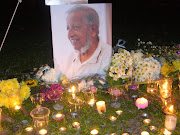The International Bar Association's Human Rights Institute, or IBAHRI for short, has just released a report called Prosperity versus individual rights? Human rights, democracy and the rule of law in Singapore.
This is what IBA had to say in a statement introducing the report,
In a report released today, the International Bar Association’s Human Rights Institute (IBAHRI) expressed concern about limitations on the freedoms of expression, assembly, and the press, and of the independence of the judiciary in Singapore. The report, Prosperity versus individual rights? Human rights, democracy and the rule of law in Singapore, makes 18 recommendations (pages 67-68), which the IBAHRI urges the Singapore Government to implement as a matter of priority.So i suppose now, the ruling party will want to sue IBAHRI for defamation while the Singapore judiciary will want to find IBAHRI in contempt of court. Duh.
‘As one of the world’s most successful economies, Singapore should be a leader in human rights and the rule of law, and should now have the confidence and maturity to recognise that this would be complementary, not contradictory, to its future prosperity,’ said Mark Ellis, Executive Director of the International Bar Association (IBA). ‘The IBAHRI has identified a number of areas in which Singapore falls far short of international standards. In particular, democratic debate and media comment are extremely restricted and government officials have initiated numerous successful defamation suits against both political and media critics.’
The IBAHRI report examines Singapore’s record on a range of human rights issues identified by the IBAHRI as a priority. This includes freedom of expression (for example, the use of defamation legislation to hinder opposition activities, and restrictions on freedom of the press and the internet), the independence of the judiciary (there have been allegations of executive influence), and freedom of assembly.
Investigations for the report began in the lead-up to the IBA’s 2007 Annual Conference in Singapore. Strong debate between the government and its critics took place during the IBA’s inaugural Rule of Law Day; an open public forum on human rights which was the first such discussion at an international conference in Singapore.
Emilio Cárdenas, Co-Chair of the IBAHRI, stated: ‘The IBAHRI has conducted a very extensive review in preparing this report, and has sought the views of all the major stakeholders concerned, including the Singapore Government and the Singapore Law Society. The report is unprecedented in its efforts to understand, respond to, and reflect the views of all sides to the debate.’
Here are two news articles about the report,
Singapore should free courts from govt influence-IBA
SINGAPORE, July 9 (Reuters) - Singapore should free its courts from any government influence and elevate human rights standards to international levels, the world's largest legal association said.
The International Bar Association's human rights arm expressed concern over the limitations of freedom of expression and the independence of Singapore courts in a 72-page report released late on Tuesday.
The global legal association noted that while the city-state had a good reputation when adjudicating commercial cases that did not involve members of the ruling People's Action Party , when it came to matters regarding PAP litigants "there are concerns about an actual or apparent lack of impartiality".
The London-based body of more than 30,000 member lawyers also said that while Singapore fared well in commercial and economic rankings, it fared poorly in press freedom rankings, which it said was a concern given that a free press can generate important dialogue on issues.
"Singapore cannot continue to claim that civil and political rights must take a back seat to economic rights, as its economic development is now of the highest order," the report said.
"The International Bar Association Human Rights Institute strongly encourages Singapore to engage with the international community in a more constructive manner, and to take steps to implement international standards of human rights," it said.
The Singapore government did not immediately comment.
DEFAMATION SUITS
Singapore, where the IBA held its annual conference last year, is among the most developed nations in Asia, with the second highest GDP per capita after Japan.
However, media and human rights groups such as Amnesty International have criticized the government for restricting freedom of expression and using defamation lawsuits to financially cripple political opponents.
In a list of 18 recommendations, the IBA urged the Singapore government to ratify the United Nations International Covenant on Civil and Political Rights, ease restrictions on the media and ensure that its courts are free from government influence.
IBA executive director said in a statement Singapore should be a leader in human-rights, and its advancement would be complementary to the city-state's future prosperity.
The IBA also noted that some publications, including The Economist and the Financial Times, have paid out-of-court settlements to avoid defamation lawsuits. The government says these lawsuits are needed to protect its reputation.
The legal body suggested the government set limits on defamation payouts in cases initiated by government officials. (Reporting by Melanie Lee, editing by Neil Chatterjee and Bill Tarrant)
Singapore falls short on rights: lawyers' group
SINGAPORE (AFP) - - Despite its impressive economic development, Singapore fails to meet international standards for political and human rights and there are concerns about the independence of its judiciary, an association of lawyers said.
The International Bar Association's Human Rights Institute identified a number of areas in which Singapore fell far short of international norms, said the association's executive director Mark Ellis.
"In particular, democratic debate and media comment are extremely restricted and government officials have initiated numerous successful defamation suits against both political and media critics," he said in a statement released late Tuesday in London.
The rights institute also issued 18 recommendations, which it said Singapore's government should implement urgently.
The group has published a 72-page report on the issue, several months after the IBA held its annual convention in Singapore. The association represents 30,000 lawyers globally.
"Singapore cannot continue to claim that civil and political rights must take a back seat to economic rights, as its economic development is now of the highest order," the report said, calling human rights universal and indivisible.
The IBA's rights institute "strongly encourages Singapore to engage with the international community in a more constructive manner, and to take steps to implement international standards of human rights throughout Singapore."
It called for Singapore to take its place as a regional leader on human rights, democracy and rule of law, as well as in business and economic development.
Singapore holds the rotating chair of the 10-member Association of Southeast Asian Nations, whose new charter calls for establishment of a regional human rights body.
The IBA report said the cases of opposition politicians J.B. Jeyaretnam and Chee Soon Juan illustrate concerns over the use of defamation laws to stifle political opposition and expression.
J.B. Jeyaretnam, 82, a lawyer, was disbarred when declared bankrupt in 2001 after failing to pay libel damages to members of the ruling People's Action Party (PAP), including a former prime minister.
Bankrupts are not allowed to run for political office, but last year he cleared his bankruptcy, and has since announced his involvement with a new political party.
Chee, secretary general of the Singapore Democratic Party, was declared bankrupt after failing to pay libel damages to Singapore's founding father Lee Kuan Yew and another former prime minister over remarks made in 2001.
Chee and his party are awaiting a judge's decision on damages against them in a separate defamation case, filed by Prime Minister Lee Hsien Loong and his father, Lee Kuan Yew.
"It certainly appears that Dr Chee has been made a target by the Singapore government, and that their criticism of him has gone far beyond a reasonable standard," the IBA wrote.
It said the Singapore judiciary had a good international reputation when adjudicating commercial cases that did not involve the interests of PAP members or their associates.
"However, in cases involving PAP litigants or PAP interests, there are concerns about an actual or apparent lack of impartiality and/or independence," it said.
The report expressed concern about "limitations on free assembly" in the city-state, and said the Law Society was not fulfilling its mandate to speak out on law reform issues.
Law Society president Michael Hwang told AFP his group could not yet comment because it had only just received the IBA report.
Government spokesmen were also not immediately able to react.
At the IBA convention last October, Lee Kuan Yew responded to allegations that his country ranked low in matters of press freedom, saying Singaporeans were free to read whatever they wanted.
He also said Singapore was built on the rule of law and did not tolerate corruption. This meant defamation action may be taken against those who impute dishonesty to government officials, in order to clear any doubts, he said.














1 comment:
Good point... will they sue the IBA now that their letter seems to confirm they did not send that glowing letter?
It's time they come clean ! Take that back !
Now's who's lying or is it down to an 'honest mistake' ? HHAHAAHAAHA
Post a Comment